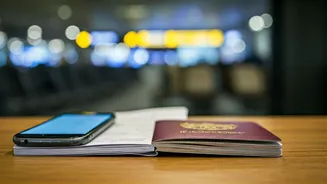Protect Your Passport
The first essential guideline involves safeguarding your passport. Never take it out of your sight when you are in a crowded place. Keep it secure in a money
belt or a secure pocket. Refrain from leaving it in hotel rooms, cars, or anywhere it might be vulnerable to theft or damage. Moreover, avoid carrying your passport unless necessary, as losing it abroad can be incredibly problematic. Make copies of your passport and store them separately. That includes the information page and any visas you have. You can also upload a scanned copy of your passport to a secure cloud service. If your passport is lost or stolen, these copies can speed up the replacement process. The steps undertaken here can significantly reduce the risks associated with passport-related issues and allow for a more seamless trip.
Avoid Unauthorized Alterations
Next, it's crucial to refrain from tampering with your passport. This includes any alterations or additions, like writing on the pages, or adding unauthorized stickers. Any kind of modification could invalidate your passport, resulting in denial of entry at borders. Even seemingly harmless actions, like using a personalized stamp, could cause issues. Moreover, avoid laminating your passport, as this can damage the document and render it unusable. Remember, your passport is an official document. Any modifications can raise suspicions and lead to potential legal consequences. Always keep your passport in its original form and condition to ensure a smooth and trouble-free journey. Maintaining the integrity of your passport is essential for maintaining its validity and ensuring its use for international travel.
Mind Expiry Dates
Ensure your passport is valid for at least six months beyond your planned return date. Many countries have this requirement, and failing to meet it could result in denied entry. Always check the specific entry requirements of the countries you plan to visit, as they might have different validity stipulations. If your passport is nearing its expiration date, renew it well in advance of your trip. Also, check the pages left in your passport before you travel. Running out of pages can also cause issues. When you are traveling, keep your passport safe in a secure location and check it periodically for any wear and tear. This practice enables you to catch any potential problems before your departure date. Planning and preparation are vital components of a successful trip.
Proper Storage is Key
Taking good care of your passport is essential. Keep it in a dry and safe place. Avoid exposing it to extreme temperatures or humidity, as these conditions can damage the document. Do not fold or bend your passport unnecessarily, as this can affect the security features, making it invalid. When you are carrying your passport, protect it from the elements. Use a waterproof pouch or a passport holder to keep it safe from rain or spills. Inspect your passport regularly for signs of damage, such as torn pages or watermarks. If you notice any damage, report it to the issuing authority immediately. The right handling and storage of your passport guarantee its longevity, allowing you to use it for many future trips.
Be Wary of Scams
Always be aware of scams, specifically those that involve your passport. Never give your passport to unauthorized persons. Be skeptical of anyone who offers to help you with your passport for a fee, unless they are legitimate travel agents or government officials. Ensure that any passport-related transactions are done through official channels. Beware of fake websites or emails asking for your passport information. Always verify the authenticity of any request for personal information. Should you encounter a suspected scam, report it to the authorities immediately. Protecting your information and your passport is of utmost importance for a safe trip. By being vigilant and informed, you can steer clear of fraudulent schemes and protect your travel documents.
Report Lost Passports
In the event that your passport is lost or stolen, report it immediately to the local police and the embassy or consulate of your country. This rapid reporting can prevent misuse of your identity and help you to get a replacement passport promptly. Provide all necessary information, including the passport number, the date and place of issue, and any other relevant details. Keep a copy of your passport separate from the original, which can assist in the reporting procedure and expedite the issuance of a new one. To obtain a replacement, you will need to provide documentation, such as a police report and proof of your identity. Follow all instructions provided by the embassy or consulate to ensure a smooth and efficient process. Prompt reporting can minimize the negative implications of losing your passport and ensure that your travel plans are only mildly disrupted.
Know Visa Requirements
Ensure you are aware of all visa requirements for your destination. Many countries require a visa for entry, and it's your responsibility to obtain it before you travel. Research the visa application process well in advance. Gather all the necessary documents and submit your application well before your departure date. Failing to secure the appropriate visa can result in denied entry or deportation. Always ensure your visa is valid for the duration of your trip. Should your itinerary change, verify your visa's validity to ensure it covers your revised travel plans. Familiarize yourself with all visa regulations and stay informed about any updates. Prior preparation ensures a smooth and legal entry into any country. Doing your research will help in enjoying your trip without travel issues.
Understand Border Rules
Familiarize yourself with the border crossing procedures for your destination. Understand the customs and immigration regulations, including what items are prohibited or restricted. Complete all necessary paperwork accurately and honestly. Answer any questions from immigration officials truthfully and politely. Be aware of the currency regulations, which dictate how much money you can bring into the country. Avoid any behavior that might be viewed as suspicious or non-compliant. By being prepared and informed, you can easily navigate border crossings. Knowing and adhering to these regulations will contribute to a faster and trouble-free entry into a new country. Doing so is crucial for a positive and compliant travel experience.





















